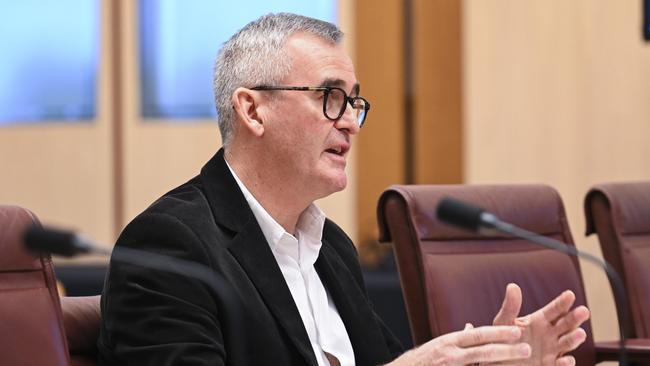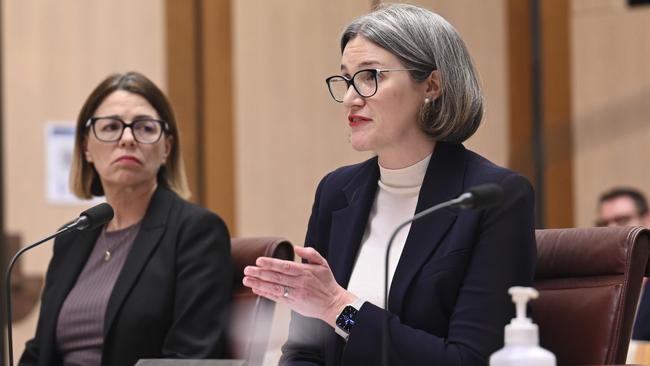Woolworths and Coles bosses say divestiture could destroy jobs and investment
Woolworths and Coles bosses have told a Senate committee hearing that forced divestiture would affect jobs growth and investment.

Business
Don't miss out on the headlines from Business. Followed categories will be added to My News.
The chief executives of the nation’s largest supermarket chains, Woolworths and Coles, say if divestiture powers were wielded to force large corporations to sell off parts of their businesses, there could be job losses and store closures – especially in rural areas.
Appearing separately before the Senate inquiry into the power of the supermarkets, Woolworths boss Brad Banducci and Coles chief Leah Weckert pushed back against chairman and Greens Senator Nick McKim and his party’s proposal to introduce divestiture powers that would allow the courts to order breakups, or store sales, if a misuse of market power were proved.
The supermarkets pair on Tuesday also rejected claims the heavyweights were engaged in “land banking” – a strategy to buy up land and properties to limit or stop a competitor opening a store in a particular neighbourhood or region – and through a gruelling day of testimony fended off allegations of price gouging, profiteering and squeezing suppliers.
After lengthy jousting and a heated exchange between Senator McKim and Mr Banducci during which the Greens Senator threatened the Woolworths boss with contempt and up to six months’ jail for not answering a direct question on financial metrics, the hearing turned to the issue of divestiture.
Ms Weckert told the inquiry she was concerned about the potential unintended consequences of a divestiture law applied to the supermarket sector.
“Our view would be there are a number of things that would be potential unintended consequences: higher prices for customers, potentially lower investment in the grocery sector in Australia, potentially poorer outcomes for regional areas and maybe job losses,” Ms Weckert said.
She said divestiture laws could put at risk rural and regional stores as it is tougher to operate in those areas due, among other things, to higher logistics costs – and which rely on the economies of scale to be maintained at efficient levels. As a result smaller towns might become reliant on independent stores which typically sell food and grocery at higher prices.
She said if Coles or other supermarkets were forced to sell off stores, due to divestiture laws, it wasn’t clear who would buy those stores.
Mr Banducci also opposed divestiture powers. “It does create some uncertainty on longer-term investments,” he said.
The federal government rejects divestiture powers, but has won the backing of some economists as well as former ACCC chairman Allan Fels.
Former Labor federal minister Craig Emerson, who has been asked by the government to conduct a review into the food and grocery code of conduct, also rejects the rationale of divestiture powers and he too clashed heavily with Senator McKim on Tuesday when he appeared before the inquiry in the late afternoon.

Senator McKim accused Coles of using its market power to “put the squeeze” on suppliers, profit gouge and engage in misuse of market power, telling Ms Weckert when she appeared that the supermarket chain uses its market power to “do over” suppliers and customers.
Ms Weckert said in response the supermarket sector in Australia was “very competitive” and that Coles worked hard to keep prices low and offer affordable food and groceries.
She said its Flybuys loyalty program had been improved to make it easier for shoppers to claim points, discounts and “access value” when shopping at Coles stores.
Ms Weckert said there were many players in the food and grocery sector, all competing with Coles, and reflecting strong competition in Australia.
Mr Banducci also disputed the view that Woolworths had a high market power and said that by including retailers like Chemist Warehouse and Amazon, as well as traditional supermarkets, then the chain’s market share was much lower.
Senator McKim asked Mr Banducci if he accepted the fact that between Woolworths and Coles the two large supermarket chains controlled around two thirds of the food and grocery sector.
Mr Banducci in response said Australians “cross shopped”, which was a good thing and showed how savvy they were, visiting other non-traditional food and grocery stores such as Chemist Warehouse and Reject Shop. He said that if you included this broader range of retailers, including Amazon, then Woolworths only had around a 20 per cent market share.
“This is as competitive as any place in the world,” Mr Banducci told Senator McKim.
He said the “arrival and growth” of Amazon, Costco and Aldi in Australia – the world’s biggest retailers – “consumers have never had more choice, and this is a good thing”.
“Consumers shop across multiple retailers”, he said.
Ms Weckert strongly rejected the allegation the supermarket chain was engaged in land banking to strangle competition. Answering a question from a Senator over the accusation, she said that even when Coles owned a site it would seek to quickly sell it to raise money and reinvest in new stores.
Originally published as Woolworths and Coles bosses say divestiture could destroy jobs and investment



